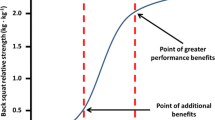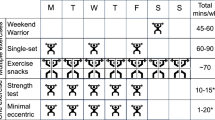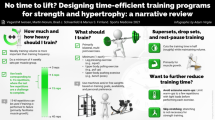Abstract
Background
Polyphenols exert physiological effects that may impact athletic performance. Polyphenols are antioxidants that have been noted to hinder training adaptations, yet conversely they stimulate stress-related cell signalling pathways that trigger mitochondrial biogenesis and influence vascular function.
Objective
To determine the overall effect of polyphenols on human athletic performance.
Methods
A search strategy was completed using MEDLINE, EMBASE, CINAHL, AMED and SPORTDiscus in April 2016. The studies were screened and independently reviewed by two researchers against predetermined criteria for eligibility. As a result of this screening, 14 studies were included for meta-analysis. Of these, the studied populations were predominately-trained males with an average intervention dose of 688 ± 478 mg·day−1.
Results
The pooled results demonstrate polyphenol supplementation for at least 7 days increases performance by 1.90% (95% CI 0.40–3.39). Sub-analysis of seven studies using quercetin identified a performance increase of 2.82% (95% CI 2.05–3.58). There were no adverse effects reported in the studies in relation to the intervention.
Conclusion
Overall the pooled results show that polyphenols, and of note quercetin, are viable supplements to improve performance in healthy individuals.




Similar content being viewed by others
References
Darvishi L, Askari G, Hariri M, et al. The use of nutritional supplements among male collegiate athletes. Int J Prev Med. 2013;4(Suppl 1):S68–72.
Kim J, Kang S, Jung H, et al. Dietary supplementation patterns of Korean Olympic athletes participating in the Beijing 2008 Summer Olympic Games. Int J Sport Nutr Exerc Metab. 2011;21(2):166–74.
Knapik JJ, Steelman RA, Hoedebecke SS, et al. Prevalence of dietary supplement use by athletes: systematic review and meta-analysis. Sports Med. 2016;46(1):103–23.
Petróczi A, Naughton DP, Mazanov J, et al. Limited agreement exists between rationale and practice in athletes’ supplement use for maintenance of health: a retrospective study. Nutr J. 2007;6(1):34–41.
Manach C, Scalbert A, Morand C, et al. Polyphenols: food sources and bioavailability. Am J Clin Nutr. 2004;79(5):727–47.
Mandel S, Youdim MB. Catechin polyphenols: neurodegeneration and neuroprotection in neurodegenerative diseases. Free Radic Biol Med. 2004;37(3):304–17.
Lagouge M, Argmann C, Gerhart-Hines Z, et al. Resveratrol improves mitochondrial function and protects against metabolic disease by activating SIRT1 and PGC-1α. Cell. 2006;127(6):1109–22.
Somerville VS, Braakhuis AJ, Hopkins WG. Effect of flavonoids on upper respiratory tract infections and immune function: a systematic review and meta-analysis. Adv Nutr. 2016;7(3):488–97.
Ristow M. Unraveling the truth about antioxidants: mitohormesis explains ROS-induced health benefits. Nat Med. 2014;20(7):709–11.
Draeger CL, Naves A, Marques N, et al. Controversies of antioxidant vitamins supplementation in exercise: ergogenic or ergolytic effects in humans? J Int Soc Sports Nutr. 2014;11(1):4–7.
Gomez-Cabrera MC, Ristow M, Vina J. Antioxidant supplements in exercise: worse than useless? Am J Physiol Endocrinol Metab. 2012;302(4):E476,7 (author reply E478–9).
Gomez-Cabrera MC, Salvador-Pascual A, Cabo H, et al. Redox modulation of mitochondriogenesis in exercise. Does antioxidant supplementation blunt the benefits of exercise training? Free Radic Biol Med. 2015;86:37–46.
Eynon N, Alves AJ, Sagiv M, et al. Interaction between SNPs in the NRF2 gene and elite endurance performance. Physiol Genomics. 2010;41(1):78–81.
Visioli F. Polyphenols in sport: facts or fads? In: Lamprecht M, editor. Boca Raton: Taylor & Francis Group, LLC; 2015.
Stevenson DE. Polyphenols as adaptogens–the real mechanism of the antioxidant effect? In: Anonymous. Croatia: InTech Rijeka; 2012. p. 143–62.
Malaguti M, Angeloni C, Hrelia S. Polyphenols in exercise performance and prevention of exercise-induced muscle damage. Oxid Med Cell Longev. 2013;2013:825928. doi:10.1155/2013/825928 (Epub 2013 Jul 24).
Labonté K, Couillard C, Motard-Bélanger A, et al. Acute effects of polyphenols from cranberries and grape seeds on endothelial function and performance in elite athletes. Sports. 2013;1(3):55–68.
Ghosh D, Scheepens A. Vascular action of polyphenols. Mol Nutr Food Res. 2009;53(3):322–31.
Kim JA, Formoso G, Li Y, et al. Epigallocatechin gallate, a green tea polyphenol, mediates NO-dependent vasodilation using signaling pathways in vascular endothelium requiring reactive oxygen species and Fyn. J Biol Chem. 2007;282(18):13736–45.
Nicholson SK, Tucker GA, Brameld JM. Effects of dietary polyphenols on gene expression in human vascular endothelial cells. Proc Nutr Soc. 2008;67(01):42–7.
Fisher ND, Hughes M, Gerhard-Herman M, et al. Flavanol-rich cocoa induces nitric-oxide-dependent vasodilation in healthy humans. J Hypertens. 2003;21(12):2281–6.
Bassett DR, Howley ET. Limiting factors for maximum oxygen uptake and determinants of endurance performance. Med Sci Sports Exerc. 2000;32(1):70–84.
Noakes T. Physiological models to understand exercise fatigue and the adaptations that predict or enhance athletic performance. Scand J Med Sci Sports. 2000;10(3):123–45.
Alexander SP. Flavonoids as antagonists at A1 adenosine receptors. Phytother Res. 2006;20(11):1009–12.
Braakhuis AJ, Hopkins WG. Impact of dietary antioxidants on sport performance: a review. Sports Med. 2015;45(7):939–55.
Myburgh KH. Polyphenol supplementation: benefits for exercise performance or oxidative stress? Sports Med. 2014;44(1):57–70.
Pelletier DM, Lacerte G, Goulet ED. Effects of quercetin supplementation on endurance performance and maximal oxygen consumption: a meta-analysis. Int J Sport Nutr Exerc Metab. 2013;23(1):73–82.
Kressler J, Millard-Stafford M, Warren GL. Quercetin and endurance exercise capacity: a systematic review and meta-analysis. Med Sci Sports Exerc. 2011;43(12):2396–404.
Moher D, Liberati A, Tetzlaff J, et al. Preferred reporting items for systematic reviews and meta-analyses: the PRISMA statement. Ann Intern Med. 2009;151(4):264–9.
McArdle WD, Katch FI, Katch VL. Essentials of exercise physiology. Philadelphia: Lippincott Williams & Wilkins; 2006.
Wilborn CD, Taylor LW, Campbell BI, et al. Effects of methoxyisoflavone, ecdysterone, and sulfo-polysaccharide supplementation on training adaptations in resistance-trained males. J Int Soc Sports Nutr. 2006;3(2):19–27.
Hopkins W, Marshall S, Batterham A, et al. Progressive statistics for studies in sports medicine and exercise science. Med Sci Sports Exerc. 2009;41(1):3–13.
Saunders MJ, Moore RW, Kies AK, et al. Carbohydrate and protein hydrolysate coingestions improvement of late-exercise time-trial performance. Int J Sport Nutr Exerc Metab. 2009;19(2):136–49.
Hinckson EA, Hopkins WG. Reliability of time to exhaustion analyzed with critical-power and log-log modeling. Med Sci Sports Exerc. 2005;37(4):696–701.
Askari G, Ghiasvand R, Paknahad Z, et al. The effects of quercetin supplementation on body composition, exercise performance and muscle damage indices in athletes. Int J Prev Med. 2013;4(1):21–6.
Kuo Y, Lin J, Bernard JR, et al. Green tea extract supplementation does not hamper endurance-training adaptation but improves antioxidant capacity in sedentary men. Appl Physiol Nutr Metab. 2015;40(10):990–6.
Hill J, Timmis A. Exercise tolerance testing. BMJ. 2002;324(7345):1084–7.
Hopkins WG. A spreadsheet for deriving a confidence interval, mechanistic inference and clinical inference from a P value. Sportscience. 2007;11:16–21.
Carr AJ, Hopkins WG, Gore CJ. Effects of acute alkalosis and acidosis on performance. Sports Med. 2011;41(10):801–14.
Toscano LT, Tavares RL, Toscano LT, et al. Potential ergogenic activity of grape juice in runners. Appl Physiol Nutr Metab. 2015;40(9):899–906.
Bigelman KA, Fan EH, Chapman DP, et al. Effects of six weeks of quercetin supplementation on physical performance in ROTC cadets. Mil Med. 2010;175(10):791–8.
Braakhuis AJ, Hopkins WG, Lowe TE. Effects of dietary antioxidants on training and performance in female runners. Eur J Sport Science. 2014;14(2):160–8.
Cureton KJ, Tomporowski PD, Singhal A, et al. Dietary quercetin supplementation is not ergogenic in untrained men. J Appl Physiol (1985). 2009;107(4):1095–104.
Davis JM, Carlstedt CJ, Chen S, et al. The dietary flavonoid quercetin increases VO2max and endurance capacity. Int J Sport Nutr. 2010;20(1):56–62.
Kang SW, Hahn S, Kim J, et al. Oligomerized lychee fruit extract (OLFE) and a mixture of vitamin C and vitamin E for endurance capacity in a double blind randomized controlled trial. J Clin Biochem Nutr. 2012;50(2):106–13.
MacRae H, Mefferd KM. Dietary antioxidant supplementation combined with quercetin improves cycling time trial performance. Int J Sport Nutr Exerc Metab. 2006;16(4):405–19.
Nieman DC, Williams AS, Shanely RA, et al. Quercetin’s influence on exercise performance and muscle mitochondrial biogenesis. Med Sci Sports Exerc. 2010;42(2):338–45.
Roberts JD, Roberts MG, Tarpey MD, et al. The effect of a decaffeinated green tea extract formula on fat oxidation, body composition and exercise performance. J Int Soc Sports Nutr. 2015;12(1):1–9.
Scholten SD, Sergeev IN, Song Q, et al. Effects of vitamin D and quercetin, alone and in combination, on cardiorespiratory fitness and muscle function in physically active male adults. Open Access J Sports Med. 2015;6:229.
Scribbans TD, Ma JK, Edgett BA, et al. Resveratrol supplementation does not augment performance adaptations or fibre-type–specific responses to high-intensity interval training in humans. Appl Physiol Nutr Metab. 2014;39(11):1305–13.
Skarpanska-Stejnborn A, Pilaczynska-Szczesniak L, Basta P, et al. The influence of supplementation with artichoke (Cynara scolymus L.) extract on selected redox parameters in rowers. Int J Sport Nutr Exerc Metab. 2008;18(3):313–27.
Rohas LM, St-Pierre J, Uldry M, et al. A fundamental system of cellular energy homeostasis regulated by PGC-1alpha. Proc Natl Acad Sci. 2007;104(19):7933–8.
Kingwell BA. Nitric oxide-mediated metabolic regulation during exercise: effects of training in health and cardiovascular disease. FASEB J. 2000;14(12):1685–96.
Green DJ, Maiorana A, O’Driscoll G, et al. Effect of exercise training on endothelium-derived nitric oxide function in humans. J Physiol. 2004;561(1):1–25.
Roberts CK, Barnard RJ, Jasman A, et al. Acute exercise increases nitric oxide synthase activity in skeletal muscle. Am J Physiol. 1999;277(2 Pt 1):E390–4.
Dulloo AG, Duret C, Rohrer D, et al. Efficacy of a green tea extract rich in catechin polyphenols and caffeine in increasing 24-h energy expenditure and fat oxidation in humans. Am J Clin Nutr. 1999;70(6):1040–5.
Hodgson AB, Randell RK, Jeukendrup AE. The effect of green tea extract on fat oxidation at rest and during exercise: evidence of efficacy and proposed mechanisms. Adv Nutr. 2013;4(2):129–40.
Kim H, Quon MJ, Kim J. New insights into the mechanisms of polyphenols beyond antioxidant properties; lessons from the green tea polyphenol, epigallocatechin 3-gallate. Redox Biol. 2014;2:187–95.
Randell RK, Hodgson AB, Lotito SB, et al. No effect of 1 or 7 d of green tea extract ingestion on fat oxidation during exercise. Med Sci Sports Exerc. 2013;45(5):883–91.
Rothwell JA, Perez-Jimenez J, Neveu V, et al. Phenol-Explorer 3.0: a major update of the Phenol-Explorer database to incorporate data on the effects of food processing on polyphenol content. Database (Oxford). 2013;2013:bat070.
Braakhuis AJ. Effect of vitamin C supplements on physical performance. Curr Sports Med Rep. 2012;11(4):180–4.
Gomez-Cabrera MC, Domenech E, Romagnoli M, et al. Oral administration of vitamin C decreases muscle mitochondrial biogenesis and hampers training-induced adaptations in endurance performance. Am J Clin Nutr. 2008;87(1):142–9.
Burke LM. Caffeine and sports performance. Appl Physiol Nutr Metab. 2008;33(6):1319–34.
Goldstein ER, Ziegenfuss T, Kalman D, et al. International society of sports nutrition position stand: caffeine and performance. J Int Soc Sports Nutr. 2010;7(1):1–5.
Author contributions
VS and AB conceived and designed the study; VS and CB performed the literature search and were responsible for decisions on inclusion/exclusion of articles (with AB as the decider if there was disagreement); VS analysed the data; VS and AB wrote the article.
Author information
Authors and Affiliations
Corresponding author
Ethics declarations
Funding
No sources of funding were used to assist in the preparation of this article.
Conflict of interest
Vaughan Somerville, Cameron Bringans and Andrea Braakhuis declare that they have no conflicts of interest relevant to the content of this review.
Additional information
An erratum to this article is available at http://dx.doi.org/10.1007/s40279-017-0702-6.
Rights and permissions
About this article
Cite this article
Somerville, V., Bringans, C. & Braakhuis, A. Polyphenols and Performance: A Systematic Review and Meta-Analysis. Sports Med 47, 1589–1599 (2017). https://doi.org/10.1007/s40279-017-0675-5
Published:
Issue Date:
DOI: https://doi.org/10.1007/s40279-017-0675-5




